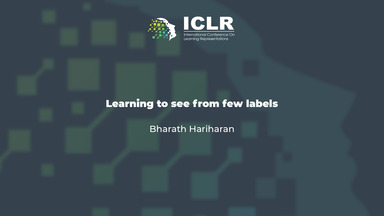Gradient Vaccine: Investigating and Improving Multi-task Optimization in Massively Multilingual Models
May 3, 2021
Speakers
Zirui Wang
Speaker · 1 follower
Yulia Tsvetkov
Speaker · 1 follower
Orhan Firat
Speaker · 0 followers
About
Massively multilingual models subsuming tens or even hundreds of languages pose great challenges to multi-task optimization. While it is a common practice to apply a language-agnostic procedure optimizing a joint multilingual task objective, how to properly characterize and take advantage of its underlying problem structure for improving optimization efficiency remains under-explored. In this paper, we attempt to peek into the black-box of multilingual optimization through the lens of loss function geometry. We find that gradient similarity measured along the optimization trajectory is an important signal, which correlates well with not only language proximity but also the overall model performance. Such observation helps us to identify a critical limitation of existing gradient-based multi-task learning methods, and thus we derive a simple and scalable optimization procedure, named Gradient Vaccine, which encourages more geometrically aligned parameter updates for close tasks. Empirically, our method obtains significant model performance gains on multilingual machine translation and XTREME benchmark tasks for multilingual language models. Our work reveals the importance of properly measuring and utilizing language proximity in multilingual optimization, and has broader implications for multi-task learning beyond multilingual modeling.Massively multilingual models subsuming tens or even hundreds of languages pose great challenges to multi-task optimization. While it is a common practice to apply a language-agnostic procedure optimizing a joint multilingual task objective, how to properly characterize and take advantage of its underlying problem structure for improving optimization efficiency remains under-explored. In this paper, we attempt to peek into the black-box of multilingual optimization through the lens of loss funct…
Categories
Visual Arts & Graphic Design
Category · 333 presentations
AI & Data Science
Category · 10.8k presentations
About ICLR 2021
The International Conference on Learning Representations (ICLR) is the premier gathering of professionals dedicated to the advancement of the branch of artificial intelligence called representation learning, but generally referred to as deep learning. ICLR is globally renowned for presenting and publishing cutting-edge research on all aspects of deep learning used in the fields of artificial intelligence, statistics and data science, as well as important application areas such as machine vision, computational biology, speech recognition, text understanding, gaming, and robotics.
Like the format? Trust SlidesLive to capture your next event!
Professional recording and live streaming, delivered globally.
Sharing
Recommended Videos
Presentations on similar topic, category or speaker
Learning to see from few labels
Watch later
CPT: Efficient Deep Neural Network Training via Cyclic Precision
Watch later
Yonggan Fu, …
Closing Remarks
Watch later
Graph Energy-Based Model for Molecular Graph Generation
Watch later
Opening remarks - How Can Findings About the Brain Improve AI Systems?
Watch later
Viewmaker Networks: Learning Views for Unsupervised Representation Learning
Watch later
Alex Tamkin, …





